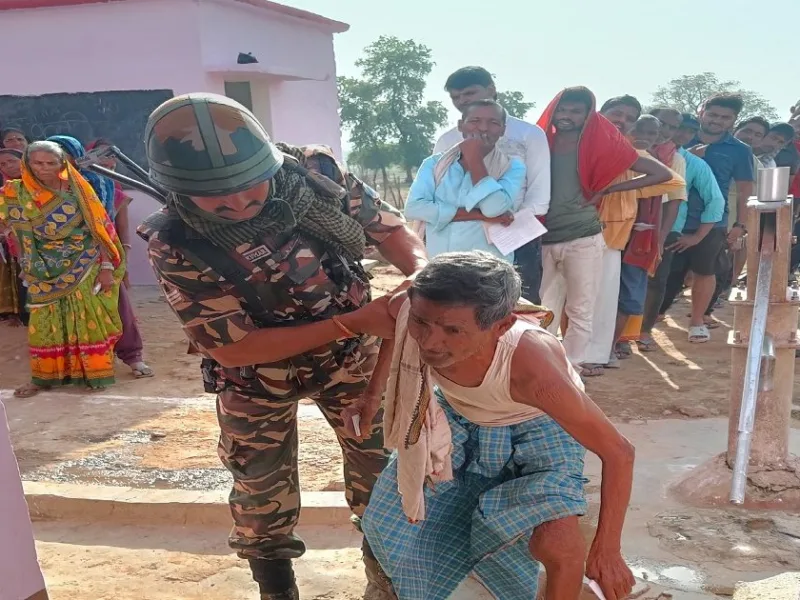- UAE में वायरल इन्फेक्शन को लेकर स्वास्थ्य मंत्रालय ने जारी की चेतावनी
- पशुओं की अंधाधुंध कटाई से फैल रहा क्रीमियन-कांगो हेमोरेजिक बुखार(CCHF)
- बुखार, मांसपेशियों में दर्द, चक्कर आना, गर्दन में दर्द और कठोरता, पीठ दर्द, सिरदर्द, आंखों की सूजन और प्रकाश की संवेदनशीलता है CCHF के लक्षण
- मतली, उल्टी, दस्त, पेट में दर्द और गले में खराश हो सकते हैं प्राथमिक CCHF के लक्षण
- CCHF वायरस के मामले में 24 घंटे के भीतर स्वास्थ्य अधिकारियों को करें सूचित
- संक्रमित जानवरों के रक्त या ऊतकों के साथ सीधे संपर्क में आने के मनुष्यों में फैलता है यह बुखार
- एक व्यक्ति से दूसरे व्यक्ति में फैल सकता है यह वायरस,
- ग्रसित व्यक्ति के रक्त, स्राव, अंगों या शरीर के अन्य तरल पदार्थों के सीधे संपर्क में आना भी CCHF का कारण
- सुरक्षा मानकों के खिलाफ चल रहे बूचड़खानों पर हो सकती है कार्रवाई
- सड़क किनारे पशुबलि करने वाले कसाई को भी दी गई है चेतावनी
Ahead of Eid Al Adha next month, the Ministry of Health and Prevention (MoHAP) on Wednesday warned about Crimean-Congo Hemorrhagic Fever (CCHF) which can spread by indiscriminate slaughtering of sacrificial animals, whether at home or by unauthorised street butchers.
The CCHF virus is classified within the list of priority diseases. In case of being affected by this virus, it should be reported within 24 hours, so that a rapid intervention for epidemiological surveillance can be undertaken by the relevant authorities. Symptoms of Crimean Fever include fever, muscle pain, dizziness, neck pain and stiffness, back pain, headache, eye inflammation and sensitivity to light. There can also be early symptoms on the first day of contracting the virus and these include nausea, vomiting, diarrhea, abdominal pain and sore throat.

Dr Hussein Abdel Rahman Al Rand, Undersecretary of the Ministry’s Health Assistant Sector, Health Centre and Clinic said: “The health ministry in cooperation with the Ministry of Climate Change and Environment, Abu Dhabi Health Authorities, Abu Dhabi Food Control Authority and the country’s municipalities works towards maintaining people’s health and safety. Healthy behaviour with regards to adoption of hygienic practices in slaughtering of sacrificial animals is important to prevent the causes of common disease transmission between the human and the animal, such as Crimean fever.”
Al Rand attributed that the rigorous system of MoHAP and other health authorities’ epidemiological surveillance for the acute CCH fever the past years, in addition to the precision of the laboratory diagnosis played a major role in reducing incidence of occurrence.
Dr Fatima Al Attar, Director, International Health Regulations and Pandemic Control Office said the fever is transmitted to humans through a tick bite, or direct contact with the blood or tissues of infected animals during or immediately after slaughter.
“The virus is transmitted from one person to another, owing to the direct contact with the person’s blood, secretions, organs or other body fluids,” she added.

Al Attar also emphasised the importance of visiting health authorities and notifying them of the previous infection and its accompanying symptoms, in the event of the onset of symptoms within two weeks of exposure to pathogens. She issued a firm warning to residents against violating the approved requirements of health and safety, in terms of the indiscriminate slaughtering away from the approved abattoirs or through the unauthorized street butchers.
“Such type of illegal slaughtering can lead to the quick spoilage of sacrificial animals, in view of the absence of the veterinary supervision, high temperatures, exposure to external pollutants and the proliferation of fly, insects and rodents due to the unsafe disposal of slaughter residues,” said Dr Al Attar.
Last year, authorised abattoirs in Dubai charged Dh 15 for slaughter of sheep or a goat, Dh25 for a calf, and Dh 40 for a cow or a camel. The prices are likely to remain in the same range. Al sacrificial animal slaughter in authorised abattoirs are carried out by skilled butchers in the presence of veterinarians to maintain the highest standards of hygiene




